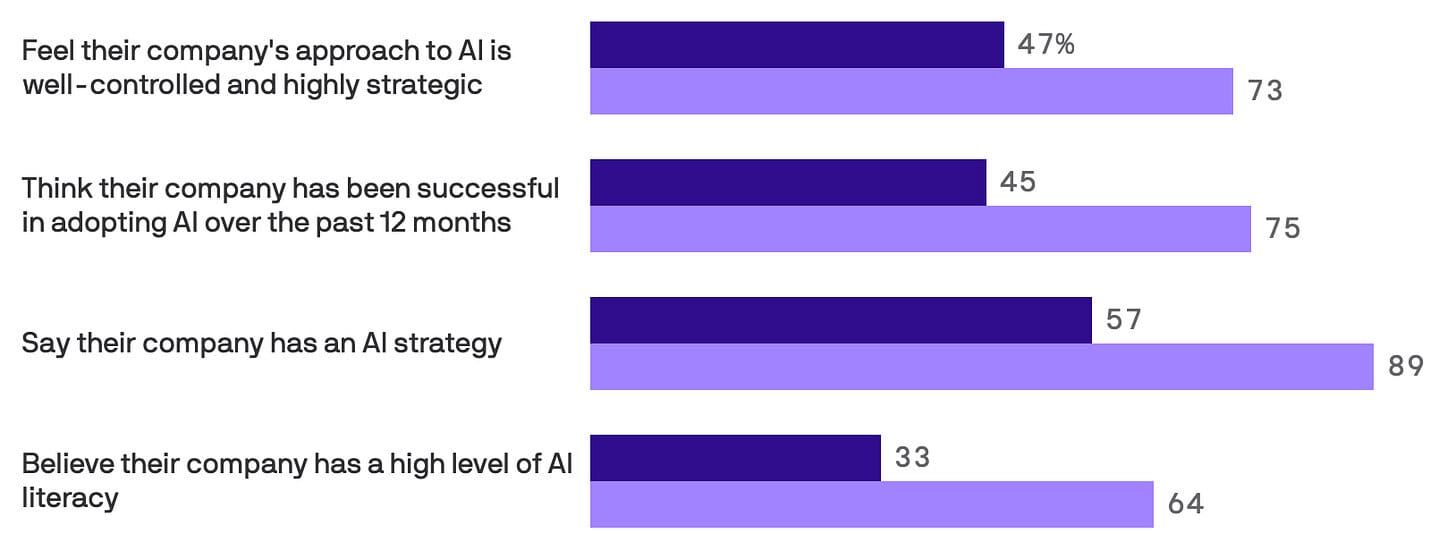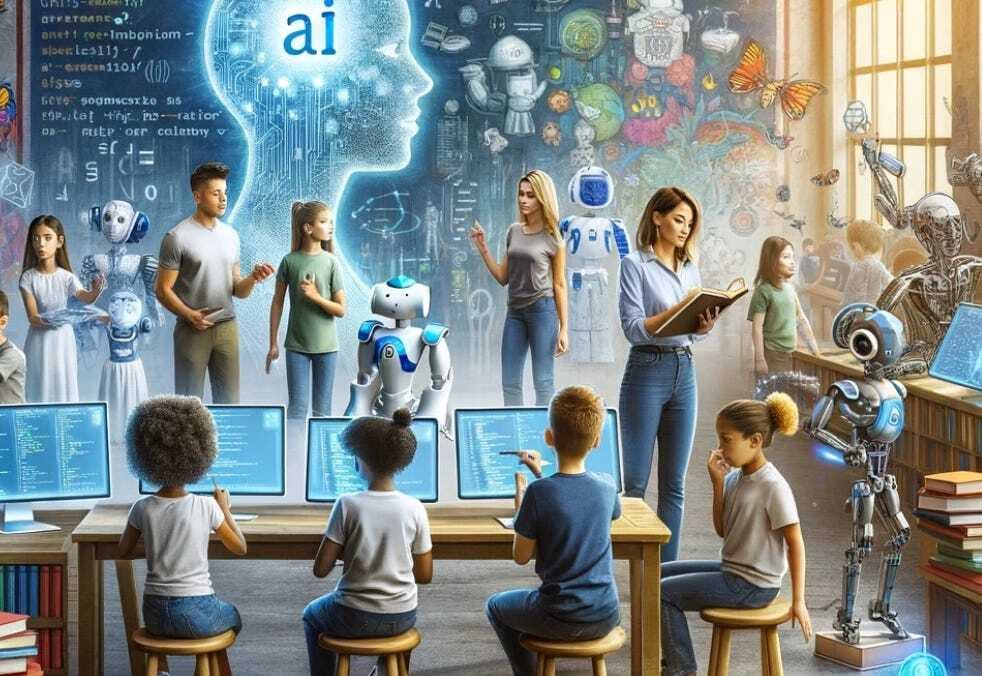- Yaro on AI and Tech Trends
- Posts
- 🎓Is AI Literacy the New College Curriculum?
🎓Is AI Literacy the New College Curriculum?
The Internal War Over AI Adoption
Morning Team,
AI often delivers information from massive databases without distinguishing fact from fiction, reshaping how we learn and trust new knowledge. Inside companies, leaders and employees are clashing over how and why to adopt AI. Meanwhile, universities are rapidly expanding their use, treating AI literacy as essential. But is full-speed adoption the right strategy? Stay curious.
When AI Can’t Tell What’s Real
The Internal War Over AI Adoption
🧰 AI Tools
🧠 Learning Corner
Is AI Literacy the New College Curriculum?
📰 AI News and Trends
Meta has named Shengjia Zhao, ChatGPT co-creator, as chief scientist of its new Superintelligence Lab to bolster its AI initiatives.
Microsoft introduced Copilot Mode in Edge, an experimental AI-driven feature designed to transform traditional web browsing.
Grok will get infinite image gen and video gen with sounds
Imax Teams With Runway On Commercial Screenings Of AI Film Festival Selections
Crypto scams are up 456% over the past year, thanks in part to ever more capable artificial intelligence tools
🌐 Other Tech news
Tesla secured a $16.5 billion agreement with Samsung to manufacture its AI6 chips at a new Texas facility.
Drugs like Ozempic and Wegovy are now linked to reduced risks for Alzheimer’s, addiction, and more, beyond just weight loss. But with monthly costs over $1,000, rising insurance premiums, and serious side effects, experts urge caution until more research is done.
Sales of Meta Platforms’ Ray-Ban smart glasses more than tripled in the first half of the year from the same period a year earlier, Ray-Ban parent company EssilorLuxottica said.
Nvidia orders 300,000 H20 chips from TSMC due to robust China demand
Waymo to Offer Rides in Dallas in 2026
DoorDash Hires Spotify Ad Chief Lee Brown
Big investors are buying this “unlisted” stock
When the founder who sold his last company to Zillow for $120M starts a new venture, people notice. That’s why the same VCs who backed Uber, Venmo, and eBay also invested in Pacaso.
Disrupting the real estate industry once again, Pacaso’s streamlined platform offers co-ownership of premier properties, revamping the $1.3T vacation home market.
And it works. By handing keys to 2,000+ happy homeowners, Pacaso has already made $110M+ in gross profits in their operating history.
Now, after 41% YoY gross profit growth last year alone, they recently reserved the Nasdaq ticker PCSO.
Paid advertisement for Pacaso’s Regulation A offering. Read the offering circular at invest.pacaso.com. Reserving a ticker symbol is not a guarantee that the company will go public. Listing on the NASDAQ is subject to approvals.
When AI Can’t Tell What’s Real

AI chatbots like ChatGPT can mislead by removing historical and cultural context, making fiction sound like fact. A recent example showed ChatGPT generating rituals that seemed satanic but were actually from Warhammer 40,000. This reflects a larger issue: AI often recycles internet content without attribution, blurring the line between fact and fiction. Without clear sources, users may mistake contextless answers for expert truth, raising concerns as AI becomes a go-to source of information.
Bottom line: AI isn’t demonic—but it can distort meaning when language is separated from its roots. What looks like dark magic may just be a Warhammer PDF.
AI tools like ChatGPT are changing how we understand history and knowledge—often in subtle but profound ways. By stripping language of its original context, AI flattens complex ideas, placing fiction, fact, and opinion side by side with equal authority. This can lead to a shallow grasp of history, where users know what happened but not why it mattered. Quick, confident answers replace deep learning and critical thinking, while biases or omissions in AI training data risk rewriting historical narratives without accountability. As AI becomes a dominant source of information, it risks reshaping not just how we learn—but what we believe to be true.
🧠 Learning Corner
Congressional Research Service AI reports
The Internal War Over AI Adoption

Survey of 800 employees and 800 C-suite executives conducted in December 2024
A new survey of 800 executives and 800 employees reveals a major disconnect in AI adoption at work. While 75% of execs think their rollout is a success, only 45% of employees agree. Nearly 60% of execs are job-hunting for more AI-forward companies, yet 41% of younger workers admit to quietly resisting AI tools altogether. Poor implementation, fear of job loss, and unreliable tools are deepening tensions. One CEO bluntly summed it up” We're all sick of the chatbots.”
🧰 AI Tools
Metacognition
Mindgrasp - Turning long lectures, documents, or YouTube videos into structured notes and summaries. Helps you understand and retain content faster through automatic mind mapping.
Elicit (by Ought) - Researching academic papers, generating hypotheses, and structuring arguments. It's like a smart research assistant that asks clarifying questions and surfaces evidence.
Pi.ai - Reflective journaling, mood tracking, or simulating thought partners. Encourages self-awareness through regular introspective conversations. Entrepreneurs and creators use it for unpacking emotional blocks or brainstorming life decisions.
Mindsera - Helps you externalize and refine your mental models with AI-delivered prompts, emotion analysis, periodic summaries, and cognitive frameworks.
Download our list of 1000+ Tools for free.
Is AI Literacy the New College Curriculum?

While Western schools debate AI’s place in the classroom, top Chinese universities are going all in. Nearly 99% of faculty and students report using generative AI, and schools like Tsinghua and Renmin are making AI literacy part of general education—even mandating it for undergrads. Local AI models like DeepSeek are widely deployed on campus servers, offering free, advanced tools to students.
With 80% of job listings now seeking AI skills, universities are shifting focus from academic integrity concerns to practical AI fluency—preparing students for China’s competitive job market and global tech race.


Reply